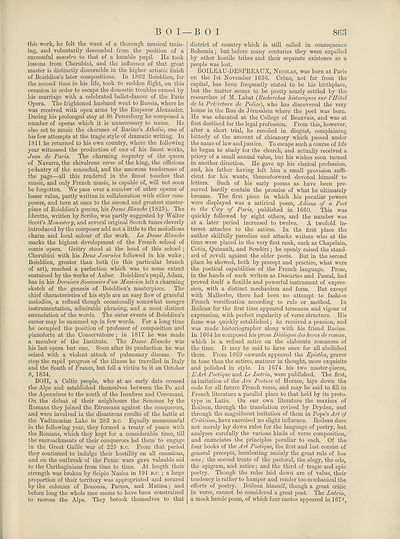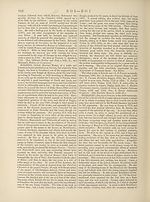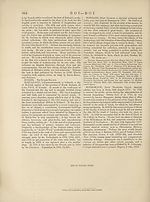Encyclopaedia Britannica > Volume 3, Athens-BOI
(875) Page 863
Download files
Complete book:
Individual page:
Thumbnail gallery: Grid view | List view

B 0 I
B 0 I-
this work, he felt the want of a thorough musical train¬
ing, and voluntarily descended from the position of a
successful maestro to that of a humble pupil. He took
lessons from Cherubini, and the influence of that great
master is distinctly discernible in the higher artistic finish
of Boieldieu’s later compositions. In 1802 Boieldieu, for
the second time in his life, took to sudden flight, on this
occasion in order to escape the domestic troubles caused by
his marriage with a celebrated ballet-dancer of the Paris
Opera. The frightened husband went to Russia, where he
was received with open arms by the Emperor Alexander.
During his prolonged stay at St Petersburg he composed a
number of operas which it is unnecessary to name. He
also set to music the choruses of Racine’s Athalie, one of
his few attempts at the tragic style of dramatic writing. In
1811 he returned to his own country, where the following
year witnessed the production of one of his finest works,
Jean de Paris. The charming coquetry of the queen
of Navarre, the chivalrous verve of the king, the officious
pedantry of the seneschal, and the amorous tenderness of
the page—all this rendered in the finest touches that
music, and only French music, is capable of, will not soon
be forgotten. We pass over a number of other operas of
lesser value, partly written in collaboration with other com¬
posers, and turn at once to the second and greatest master¬
piece of Boieldieu’s genius, his Dame Blanche (1825). The
libretto, written by Scribe, was partly suggested by Walter
Scott’s Monastery, and several original Scotch tunes cleverly
introduced by the composer add not a little to the melodious
charm and local colour of the work. La Dame Blanche
marks the highest development of the French school of
comic opera. Gretry stood at the head of this school;
Cherubini with his Deux Journees followed in his wake;
Boieldieu, greater than both (in this particular branch
of art), reached a perfection which was to some extent
sustained by the works of Auber. Boieldieu’s pupil, Adam,
has in his Derniers Souvenirs d'un Musicien left a charming
sketch of the genesis of Boieldieu’s masterpiece. The
chief characteristics of his style are an easy flow of graceful
melodies, a refined though occasionally somewhat meagre
instrumentation, admirable phrasing, and a most distinct
enunciation of the words. The outer events of Boieldieu’s
career may be summed up in few words. For a long time
he occupied the position of professor of composition and
pianoforte at the Conservatoire; in 1817 he was made
a member of the Institute. The Dame Blanche was
his last opera but one. Soon after its production he was
seized with a violent attack of pulmonary disease. To
stop the rapid progress of the illness he travelled in Italy
and the South of France, but fell a victim to it on October
8, 1834.
BOH, a Celtic people, who at an early date crossed
the Alps and established themselves between the Po and
the Apennines to the south of the Insubres and Cenomani.
On the defeat of their neighbours the Senones by the
Romans they joined the Etruscans against the conquerors,
and were involved in the disastrous results of the battle at
the Yadimonian Lake in 283 b.c. Equally unsuccessful
in the following year, they formed a treaty of peace with
the Romans, which they kept for a considerable time, till
the encroachments of their conquerors led them to engage
in the Great Gallic war of 225 b.c. From that period
they continued to indulge their hostility on all occasions,
and on the outbreak of the Punic wars gave valuable aid
to the Carthaginians from time to time. At length their
strength was broken by Scipio Nasica in 191 b.c. ; a large
proportion of their territory was appropriated and secured
by the colonies of Bononia, Parma, and Mutina; and
before long the whole race seems to have been constrained
to recross the Alps. They betook themselves to that
863
district of country which is still called in consequence
Bohemia; but before many centuries they were expelled
by other hostile tribes and their separate existence as a
people was lost.
BOILEAU-DESPREAUX, Nicolas, was born at Paris
on the 1st November 1636. Crone, not far from the
capital, has been frequently stated to be his birthplace,
but the matter seems to be pretty nearly settled by the
researches of M. Rabat (Recherches historiques sur VHotel
de la Prefecture de Police), who has discovered the very
house in the Rue de Jerusalem where the poet was born.
He was educated at the College of Beauvais, and was at
first destined for the legal profession. From this, however,
after a short trial, he recoiled in disgust, complaining
bitterly of the amount of chicanery which passed under
the name of law and justice. To escape such a course of life
he began to study for the church, and actually received a
priory of a small annual value, but his wishes soon turned
in another direction. He gave up his clerical profession,
and, his father having left him a small provision suffi¬
cient for his wants, thenceforward devoted himself to
letters. Such of his early poems as have been pre¬
served hardly contain the promise of what he ultimately
became. The first piece in which his peculiar powers
were displayed was a satirical poem, Adieus of a Poet
to the City of Paris, published in 1660. This was
quickly followed by eight others, and the number was
at a later period increased to twelve. A twofold in¬
terest attaches to the satires. In the first place the
author skilfully parodies and attacks writers who at the
time were placed in the very first rank, such as Chapelain,
Cotin, Quinault, and Scuderi; he openly raised the stand¬
ard of revolt against the older poets. But in the second
place he showed, both by precept and practice, what were
the poetical capabilities of the French language. Prose,
in the hands of such writers as Descartes and Pascal, had
proved itself a flexible and powerful instrument of expres¬
sion, with a distinct mechanism and form. But except
with Malherbe, there had been no attempt to fashion
French versification according to rule or method. In
Boileau for the first time appeared terseness and vigour of
expression, with perfect regularity of verse structure. His
fame was quickly established; he received a pension, and
was made historiographer along with his friend Racine.
In 1664 he composed his prose Dialogue des heros de roman,
which is a refined satire on the elaborate romances of
the time. It may be said to have once for all abolished
them. From 1669 onwards appeared the Epistles, graver
in tone than the satires, maturer in thought, more exquisite
and polished in style. In 1674 his two master-pieces,
HArt Poetique and Le Lutrin, were published. The first,
in imitation of the Ars Poetica of Horace, lays down the
code for all future French verse, and may be said to fill in
French literature a parallel place to that held by its proto¬
type in Latin. On our own literature the maxims of
Boileau, through the translation revised by Dryden, and
through the magnificent imitation of them in Pope’s Art of
Criticism, have exercised no slight influence. Boileau does
not merely lay down rules for the language of poetry, but
analyses carefully the various kinds of verse composition,
and enunciates the principles peculiar to each. Of the
four books of the Art Poetique, the first and last consist of
general precepts, inculcating mainly the great rule of bon
sens; the second treats of the pastoral, the elegy, the ode,
the epigram, and satire; and the third of tragic and epic
poetry. Though the rules laid down are of value, their
tendency is rather to hamper and render too mechanical the
efforts of poetry. Boileau himself, though a great critic
in verse, cannot be considered a great poet. The Lutrin,
a mock heroic poem, of which four cantos appeared in 167^,
B 0 I-
this work, he felt the want of a thorough musical train¬
ing, and voluntarily descended from the position of a
successful maestro to that of a humble pupil. He took
lessons from Cherubini, and the influence of that great
master is distinctly discernible in the higher artistic finish
of Boieldieu’s later compositions. In 1802 Boieldieu, for
the second time in his life, took to sudden flight, on this
occasion in order to escape the domestic troubles caused by
his marriage with a celebrated ballet-dancer of the Paris
Opera. The frightened husband went to Russia, where he
was received with open arms by the Emperor Alexander.
During his prolonged stay at St Petersburg he composed a
number of operas which it is unnecessary to name. He
also set to music the choruses of Racine’s Athalie, one of
his few attempts at the tragic style of dramatic writing. In
1811 he returned to his own country, where the following
year witnessed the production of one of his finest works,
Jean de Paris. The charming coquetry of the queen
of Navarre, the chivalrous verve of the king, the officious
pedantry of the seneschal, and the amorous tenderness of
the page—all this rendered in the finest touches that
music, and only French music, is capable of, will not soon
be forgotten. We pass over a number of other operas of
lesser value, partly written in collaboration with other com¬
posers, and turn at once to the second and greatest master¬
piece of Boieldieu’s genius, his Dame Blanche (1825). The
libretto, written by Scribe, was partly suggested by Walter
Scott’s Monastery, and several original Scotch tunes cleverly
introduced by the composer add not a little to the melodious
charm and local colour of the work. La Dame Blanche
marks the highest development of the French school of
comic opera. Gretry stood at the head of this school;
Cherubini with his Deux Journees followed in his wake;
Boieldieu, greater than both (in this particular branch
of art), reached a perfection which was to some extent
sustained by the works of Auber. Boieldieu’s pupil, Adam,
has in his Derniers Souvenirs d'un Musicien left a charming
sketch of the genesis of Boieldieu’s masterpiece. The
chief characteristics of his style are an easy flow of graceful
melodies, a refined though occasionally somewhat meagre
instrumentation, admirable phrasing, and a most distinct
enunciation of the words. The outer events of Boieldieu’s
career may be summed up in few words. For a long time
he occupied the position of professor of composition and
pianoforte at the Conservatoire; in 1817 he was made
a member of the Institute. The Dame Blanche was
his last opera but one. Soon after its production he was
seized with a violent attack of pulmonary disease. To
stop the rapid progress of the illness he travelled in Italy
and the South of France, but fell a victim to it on October
8, 1834.
BOH, a Celtic people, who at an early date crossed
the Alps and established themselves between the Po and
the Apennines to the south of the Insubres and Cenomani.
On the defeat of their neighbours the Senones by the
Romans they joined the Etruscans against the conquerors,
and were involved in the disastrous results of the battle at
the Yadimonian Lake in 283 b.c. Equally unsuccessful
in the following year, they formed a treaty of peace with
the Romans, which they kept for a considerable time, till
the encroachments of their conquerors led them to engage
in the Great Gallic war of 225 b.c. From that period
they continued to indulge their hostility on all occasions,
and on the outbreak of the Punic wars gave valuable aid
to the Carthaginians from time to time. At length their
strength was broken by Scipio Nasica in 191 b.c. ; a large
proportion of their territory was appropriated and secured
by the colonies of Bononia, Parma, and Mutina; and
before long the whole race seems to have been constrained
to recross the Alps. They betook themselves to that
863
district of country which is still called in consequence
Bohemia; but before many centuries they were expelled
by other hostile tribes and their separate existence as a
people was lost.
BOILEAU-DESPREAUX, Nicolas, was born at Paris
on the 1st November 1636. Crone, not far from the
capital, has been frequently stated to be his birthplace,
but the matter seems to be pretty nearly settled by the
researches of M. Rabat (Recherches historiques sur VHotel
de la Prefecture de Police), who has discovered the very
house in the Rue de Jerusalem where the poet was born.
He was educated at the College of Beauvais, and was at
first destined for the legal profession. From this, however,
after a short trial, he recoiled in disgust, complaining
bitterly of the amount of chicanery which passed under
the name of law and justice. To escape such a course of life
he began to study for the church, and actually received a
priory of a small annual value, but his wishes soon turned
in another direction. He gave up his clerical profession,
and, his father having left him a small provision suffi¬
cient for his wants, thenceforward devoted himself to
letters. Such of his early poems as have been pre¬
served hardly contain the promise of what he ultimately
became. The first piece in which his peculiar powers
were displayed was a satirical poem, Adieus of a Poet
to the City of Paris, published in 1660. This was
quickly followed by eight others, and the number was
at a later period increased to twelve. A twofold in¬
terest attaches to the satires. In the first place the
author skilfully parodies and attacks writers who at the
time were placed in the very first rank, such as Chapelain,
Cotin, Quinault, and Scuderi; he openly raised the stand¬
ard of revolt against the older poets. But in the second
place he showed, both by precept and practice, what were
the poetical capabilities of the French language. Prose,
in the hands of such writers as Descartes and Pascal, had
proved itself a flexible and powerful instrument of expres¬
sion, with a distinct mechanism and form. But except
with Malherbe, there had been no attempt to fashion
French versification according to rule or method. In
Boileau for the first time appeared terseness and vigour of
expression, with perfect regularity of verse structure. His
fame was quickly established; he received a pension, and
was made historiographer along with his friend Racine.
In 1664 he composed his prose Dialogue des heros de roman,
which is a refined satire on the elaborate romances of
the time. It may be said to have once for all abolished
them. From 1669 onwards appeared the Epistles, graver
in tone than the satires, maturer in thought, more exquisite
and polished in style. In 1674 his two master-pieces,
HArt Poetique and Le Lutrin, were published. The first,
in imitation of the Ars Poetica of Horace, lays down the
code for all future French verse, and may be said to fill in
French literature a parallel place to that held by its proto¬
type in Latin. On our own literature the maxims of
Boileau, through the translation revised by Dryden, and
through the magnificent imitation of them in Pope’s Art of
Criticism, have exercised no slight influence. Boileau does
not merely lay down rules for the language of poetry, but
analyses carefully the various kinds of verse composition,
and enunciates the principles peculiar to each. Of the
four books of the Art Poetique, the first and last consist of
general precepts, inculcating mainly the great rule of bon
sens; the second treats of the pastoral, the elegy, the ode,
the epigram, and satire; and the third of tragic and epic
poetry. Though the rules laid down are of value, their
tendency is rather to hamper and render too mechanical the
efforts of poetry. Boileau himself, though a great critic
in verse, cannot be considered a great poet. The Lutrin,
a mock heroic poem, of which four cantos appeared in 167^,
Set display mode to:
![]() Universal Viewer |
Universal Viewer | ![]() Mirador |
Large image | Transcription
Mirador |
Large image | Transcription
Images and transcriptions on this page, including medium image downloads, may be used under the Creative Commons Attribution 4.0 International Licence unless otherwise stated. ![]()
| Encyclopaedia Britannica > Encyclopaedia Britannica > Volume 3, Athens-BOI > (875) Page 863 |
|---|
| Permanent URL | https://digital.nls.uk/193661676 |
|---|
| Attribution and copyright: |
|
|---|---|
| Shelfmark | EB.17 |
|---|---|
| Description | Ten editions of 'Encyclopaedia Britannica', issued from 1768-1903, in 231 volumes. Originally issued in 100 weekly parts (3 volumes) between 1768 and 1771 by publishers: Colin Macfarquhar and Andrew Bell (Edinburgh); editor: William Smellie: engraver: Andrew Bell. Expanded editions in the 19th century featured more volumes and contributions from leading experts in their fields. Managed and published in Edinburgh up to the 9th edition (25 volumes, from 1875-1889); the 10th edition (1902-1903) re-issued the 9th edition, with 11 supplementary volumes. |
|---|---|
| Additional NLS resources: |
|

